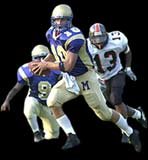Compounding the problem, many athletes are under the impression that a few drinks before an event can be a strong ergogenic aid. It is touted as being a powerful tool to increase mental alertness, calm the nerves and dull the sensation of pain. With a few drinks, some athletes say they feel more alert, more confident and almost "fearless".
In sports requiring steady, smooth and controlled movements, its reputation for reducing muscle tremor and anxiety can be especially appealing. (3) Let's take a close look at alcohol and what its use and abuse really does to your athletic performance, your physique and your health. 
Alcohol can be classified as either a food or a drug. As a food, it is quite caloric dense. At 7 calories per gram, alcohol provides almost twice the calories per gram of either carbohydrates or protein, but still fewer than a gram of fat. The calories from alcohol are considered "empty", because alcoholic beverages contain only negligible amounts of vitamins and minerals.
In addition to this, alcohol is often called the antinutrient nutrient, because it directly interferes with the body's absorption, storage and use of other nutrients. (2) As a drug, alcohol is classified as an addictive narcotic. It is classified as a depressant, but appears to have a two-part response: an initial sensation of excitement followed by depressive psychomotor effects. (3) Men are less sensitive to the drug than women, probably because men have a certain enzyme in the stomach that disposes of some alcohol before allowing it into the bloodstream. (2)
Effects On Athletic Performance
As an ergogenic aid, alcohol is proposed to:
- Calm the nerves
- Reduce inhibitions
- Increase mental alertness
- Reduce pain
- Reduce muscle tremor
Despite the many positive proposed benefits of alcohol as an ergogenic aid, studies have shown it to have the exact opposite effect to those above in most categories. (3)
Alcohol has been proven to:
- Decrease accuracy, balance, and reaction time
- Slow visual tracking and information processing
- Decrease strength, power and muscle endurance*
- Dehydrate the body
It appears that alcohol produces the "feeling" of improved psychomotor skills, when in fact they are impaired while under the influence of even a very small amount of the drug. (3) There is some evidence that alcohol may be able to reduce anxiety and muscle tremor,** but the associated decrease in coordination, balance and information processing would negate any real benefit to sport performance gained from the advantage in those areas. (1)
The depressive effect of alcohol dulls the sensation of pain, but pain indicates injury. The athlete on alcohol runs a greater risk of increasing the severity of an injury because without pain, they may be unaware of the extent of the damage. In addition, alcohol dehydrates the body by blocking the release of antidiuretic hormone, causing the kidneys to excrete excess body fluid in the form of urine. (3)
Effect On Your Physique & Your Health
Since alcohol contains calories, anyone interested in weight management must count these 7 calories per gram in their total intake. These calories can quickly add up. In addition to this, alcohol interferes with the absorption and utilization of many vitamins and minerals, which can ultimately slow the processing of protein and carbohydrates. Also significant is the liver damage associated with regular alcohol use.
 Alcohol interferes with the metabolism of protein and fat in the liver, and alcohol causes impaired production of pancreatic enzymes needed for fat metabolism. An inability to mobilize body fat and high blood lipid (fat) levels may result. Liver glycogen may become depleted along with an inability of the liver to form new glucose. (2) The end result is the body of the alcohol user will have a strong tendency to store body fat and a very hard time gaining or maintaining lean body mass. An alcohol user's energy, strength and endurance levels will drop, hindering the desire to exercise, further complicating the problem.
Alcohol interferes with the metabolism of protein and fat in the liver, and alcohol causes impaired production of pancreatic enzymes needed for fat metabolism. An inability to mobilize body fat and high blood lipid (fat) levels may result. Liver glycogen may become depleted along with an inability of the liver to form new glucose. (2) The end result is the body of the alcohol user will have a strong tendency to store body fat and a very hard time gaining or maintaining lean body mass. An alcohol user's energy, strength and endurance levels will drop, hindering the desire to exercise, further complicating the problem.
Can Alcohol Be Good For The Heart?
Current evidence suggests that moderate alcohol consumption is associated with a lower risk of heart disease in some people. It was found that one drink per day (and no more) can increase the level of high-density lipoproteins (HDL's) in the blood. (1) HDL's are known as the "good cholesterol" and are responsible for keeping your arteries clear.
It is not advisable that one consume alcohol for the reason of reduced risk of heart disease because of all the negative effects associated with alcohol consumption. So far, this is the only possible benefit of alcohol on your health, while there are innumerable known risks.
One drink is defined as:
- 12 ounces of regular beer
- 5 ounces of wine
- 1.5 ounces of 80-proof liquor
- 1.0 ounce of 100-proof liquor
I hope you enjoyed and learned a lot from reading this article. I thoroughly enjoyed and benefited from researching and writing it! There are so many more risk factors associated with alcohol consumption that I made no mention of here in an effort to keep most of my focus in the realm of sports and fitness. Feel free to email me at parsons@issaonline.com with comments or for suggested further reading on the subject. Good luck with your training!
* Some studies have demonstrated this effect, while others have not.
** Some studies have shown that drinking causes muscle tremors, so no definitive conclusion can be drawn to this effect.
References
1. Kleiner, S.M. In High Spirits?: Alcohol and Your Health. The Physician and Sportsmedicine. 24:9. 1996.
2. Leiber, C.S. The nutritional effects of alcohol. In: Total Nutrition: the Only Guide You'll Ever Need. New York: St. Martin's Press, 1995. pp 348-358.
3. Wilmore, J.H. Costill, D.L. Physiology of sport and exercise. Champaign, IL: Human Kinetics. 1994.
